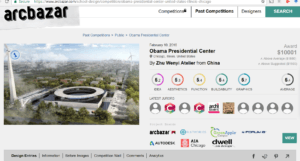ArcBazar: Crowdsourcing Design
The worst thing to happen to architecture?
ArcBazar is a crowdsourcing platform for architecture projects. Traditionally, architecture companies were sole selected to perform work or perhaps shortlisted with not many more other companies to compete in a bidding process. On ArcBazar, a client posts a project description including project constraints, timeline and perhaps visuals.
The advantage of ArcBazar is allegedly superior choice from quality architecture firms, competitive or perhaps lower cost and/or competitive or perhaps quicker delivery of architectural design. ArcBazar advertises increased access to high quality/professional architectural services as a benefit to platform users. ArcBazar advertises that even professional architectural outfits can outsource certain architecture sub-tasks to the crowdsourcing marketplace.
On average, ten great designs are proposed.
ArcBazar controls entries through a client-centered selection process. The client evaluates the 10 average proposals based on cost, schedule and proposal quality. The client also evaluates architecture outfit credentials through past work on and outside of ArcBazar. The client ranks the top submissions and the top three outfits collect the project award: 60% for first place, 30% for second and 10% for third. ArcBazar automatically describes a set of documents & deliverables required for project completion.
The client may elect to award bonuses to firms not in the top 3 for exceptional performance. Once the completion has concluded, the client may choose to work together with the winning firms, or perhaps local design & construction firms to finalize details and execute the project. Clients may elect to do the work themselves.
Some established architecture firms have complained that platforms like ArcBazar move higher skill/quality services and professions towards the TaskRabbit spectrum of low cost services. However, co-founder Ana Batista positions ArcBazar as providing a service that targets non-consumption – for example, plenty of small home developments never looked to an architecture/design studio due to being priced out and/or being too complicated to do business with. Counter-arguments include that architecture firms typically engage in RFPs or request for proposals without expectation for substantial, if any, remuneration before being selected as the architecture firm for a project.
Further criticism is that a global pool of architects is not necessarily versed in local design and construction codes, leading to lower quality designs. Furthermore, quality designs & bids that do not fall within the top 3 of a competition end up doing work free of charge. ArcBazar fights back this point by positioning the platform as an idea generator as opposed to a site for detailed construction plans.
The site has a $250 minimum reward, and ArcBazar picks up 15% in addition to the award for designers. It is free to sign up and upload information and kick start a competition.
Harvard & MIT heavyweight investors, professors and businessmen have joined the board.
Growth potential is exciting, considering an order of magnitude cost reduction for architectural design ideas from existing design studios. Remodeling captures 46% of project distributions, interiors 17%, landscaping 13%, new residential 12%, commercial 10% and public just under 2%. 84% of all competitions are based in the US (31% designers in US), 5% in Europe (41% designers in Europe), with Asia at 5% projects. Considering the vast population in the world is outside of Europe and North America, there is certainly growth potential going forward.
ArcBazar CEO estimates the total addressable market size as $22 billion USD.
https://www.crunchbase.com/organization/arcbazar-com#/entity
http://www.ocregister.com/articles/design-602892-arcbazar-designs.html?page=1
http://www.archdaily.com/497828/why-criticisms-of-crowdsourcing-don-t-add-up




I haven’t heard of them before – very interesting! Do you know if Arcbazar makes sure that only accredited architects submit proposals? Is anyone liable that the proposed design complies to minimum requirements and can actually be built?
I’m not sure there is any credibility floor required, however, 48% of winners have a Master’s degree, 36% of winning bidders have a Bachelor’s degree. Architecture is an incredibly experience intensive education/skillset so these numbers should not be surprising.
On minimum requirements, ArcBazar markets’ itself as an ideas marketplace, where the client can here a local firm post competition to ensure compliance with local laws.
Interesting, I really like this idea! This is essentially HourlyNerd but for architects, except it has a better chance for success in my opinion. This gives the client concrete solutions to a physical problem they’re trying to solve, so they truly won’t care whether it’s coming from amateurs on the internet/freelance architects, or from real architectural firms, unlike consulting, where the political stamp of approval afforded by top consulting firms is extremely valuable.
Referring to my reply to Carolin, most winning bidders end up being educated designers (48% masters, 36% bachelors). I think you are right on the “stamp”/CYA aspect of consulting/difference with a crowd marketplace like ArcBazar, although I do think that being a top-rated designer/design studio does add credibility and selection bias for the client. It would be an interesting test to run whether companies that have won multiple competitions in the past have an inherent advantage over companies/bidders with significantly less/nil experience.
Repeated use of the platform by customers would be rare. Wonder what their CAC is. Also recommend A/B testing a model where the architects set a range of fees they would charge for their work, the customer states his budget, the platform then only shows the project to architects within the budget, and the customer does not actually see the architect’s quoted price for a project till after they shortlist their top-three designs. This could limit the price-war.